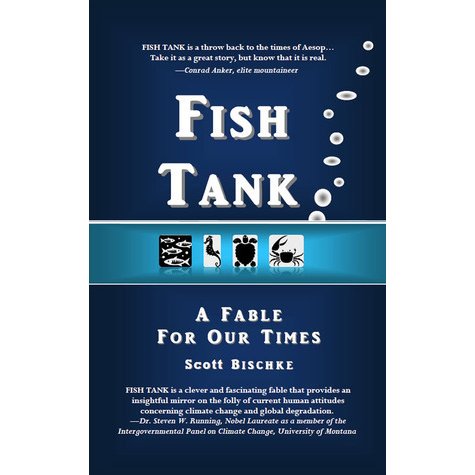 I’m often approached by teachers looking for new ways to connect their students to climate change. Sure there are lessons and videos galore through groups like the CLEAN network, but what about books that are engaging and, most importantly, age-appropriate? That becomes a trickier task, particularly as middle school and elementary teachers try to find new ways to engage their students. As I was looking for ideas to help them out, I was thrilled to discover Scott Bischke’s book, Fish Tank: A Fable For Our Times. Bischke, a chemical and environmental engineer by training, has worn many different hats, from working as a researcher at national laboratories, to serving on the Mayor’s Task Force, to drafting the municipal climate action plan in his hometown of Bozeman, MT. Each time we chatted he was either on his way to or just back from another wild adventure.
I’m often approached by teachers looking for new ways to connect their students to climate change. Sure there are lessons and videos galore through groups like the CLEAN network, but what about books that are engaging and, most importantly, age-appropriate? That becomes a trickier task, particularly as middle school and elementary teachers try to find new ways to engage their students. As I was looking for ideas to help them out, I was thrilled to discover Scott Bischke’s book, Fish Tank: A Fable For Our Times. Bischke, a chemical and environmental engineer by training, has worn many different hats, from working as a researcher at national laboratories, to serving on the Mayor’s Task Force, to drafting the municipal climate action plan in his hometown of Bozeman, MT. Each time we chatted he was either on his way to or just back from another wild adventure.
It turns out that the book is as compelling as Bischke. Without giving too much away, the book follows the story of a group of sea creatures (from fish to turtles) living happily in a fish tank. When the owner goes away, they are left with a caretaker who ignores their needs and takes off for the season. Left to their own devices, they have to work to resolve issues as resources dwindle, the temperature heats up, and a small crack starts to develop on the side of the tank. Can they work collectively to figure out a response that benefits everyone, or will there be definite winners and losers? A clear metaphor for climate change, this book takes a thriller angle to get you on the edge of your seat—will these sea creatures be able to pull together to save their own little planet?
I not only got Bischke to chat with me this week about his book, but also convinced him to donate 24 books for a give-away to one lucky teacher! More on that at the bottom of the blog (be sure to enter to win!). In the meantime, here's a Q&A with the author!
Q. What was the inspiration for this book?
A. Climate change or, more broadly, environmental protection, has run through my career as a regular theme. I also love writing, and have written four well-received (thankfully!) popular press books. After tackling climate change from many perspectives--as a researcher, an engineer in an industrial setting, a social servant in local government, and an advocate--it seemed like the only avenue left was literature. Hence, the concept for Fish Tank was born.
I settled on this choice of story during a 90-minute drive from Helena, where I'd just attended an energy conference. Funnier still, I wrote Fish Tank in my head during those 90 minutes. Not verbatim, of course, but I had the setting as well as the entire plot line and characters described, probably to 95% of what the finished book would become. After that it was simply a matter of putting pencil to paper (OK, fingers to keyboard, but that just doesn't sound as poetic).
Q. Have you seen people use your book in the classroom before? What sorts of conversations did it start?
A. Fish Tank has been used in a variety of settings and at a variety of levels. While most of the classrooms have been in the middle school age group, I am aware of classes from 5th grade to college using it as a catalyst for the discussion of climate change.
Teachers report that students love the book's characters, which of course is an important first step in getting students engaged in the story and how it might apply to their lives. Some readers end up being happy, or sad, or mad, all of which are good responses. The key is that the story brings them into a world where they are thinking about climate change. And that world is an accessible place—not scary or boring or filled with data and doomsday proclamations. Instead it is a place of story, a cerebral place, a place to reflect upon and then perhaps consider how similar scenarios are playing out in their own lives.
Along with classrooms, Fish Tank has been used as a book-of-the-month reading selection for a number of book clubs. Foremost among them, surely, was the Climate Stewards Program of the National Oceanic and Atmospheric Association, made up of educators from across the country.
And here's something really intriguing: A church in Arizona asked if they might adapt Fish Tank to be a readers’ play for their kids. I said "Absolutely!" with really only two stipulations: that they remain true to the story, and that they make the play they develop available for free to any teacher (or others) who might want to use it. They will be putting on the play on April 24th, 2016 and have invited me to attend. Wow, sorry to gush, but I am really excited to see the results of their efforts!
Q. In the story, the Earth is represented by a fish tank, and the fish are desperately working to either take advantage of the resources or try to save them. This is a pretty clear analogy to climate change. What made you choose the setting for this story?
A. The Martian aside, we are isolated here on Earth, "It's the only planet we have, we can't mess it up" as some have taken to saying. So I wanted a closed space that evoked that same challenge. I toyed with numerous ideas, but finally settled on an aquarium as the perfect metaphor, an essentially closed system that all creatures, regardless of their political bent, rely upon for their lives.
Q. In the story you have different characters with different approaches to conservation. Can you talk more about how your sea creature characters relate to what you've seen in the real world?
A. Sure I can, but I'd rather not. Why? Because the question runs against what I am trying to achieve with Fish Tank. What I think as the author has some value, of course, but what I am really after is for the reader to determine for themselves who the characters represent. They may see leaders, followers, activists, scientists, politicians, business people, news people, the disinterested general public, corporations, and much more. Who the characters of the book represent is for the reader to decide. That's one of the things I love about allegories—to me there is no right or wrong interpretation.
Q. What do you want kids to take away from the book?
A. I want readers—be they kids, teens, or adults—to come away from Fish Tank thinking critically about the most important issue of our times, climate change, and how society makes decisions around climate change. We must engage people in every possible way with this discussion. Some will react to data, some to trusted scientists, some to celebrities they care about (even if said celebrity has no standing in the field—I don't know why, it's just true). And some will react to this story because for them, for so many of us, stories can change the world. That's my biggest hope.
And if you'll allow me to be even more altruistic for a moment, my ultimate goal for the book is to help change society’s discussion from one of denial and “Who cares?” to one of understanding and “What can I do?” The success or failure of that goal, of course, rests with Fish Tank's readers. But for me, I am certain of one thing: I want to leave the next generation and generations to come the world they deserve, not one that has limitations put upon it by my generation’s sense of entitlement, lack of foresight, or, perhaps worst yet, complacency.
Q. How do you think teachers could best utilize the book in their classrooms?
A. Gosh, that's a tough one for me, not being a teacher and recognizing that I don't know the ins and outs of how teachers inspire their students. One thing I do know is that I have the greatest respect for teachers and the critical role they play in shaping students’ minds and, hence, the future of our society.
That said, I created an in-depth discussion guide for teachers (and book clubs), which is available in one version of the book. I tried to capture the essence of what I hope to convey in the book through the discussion guide. I think the questions there can be invaluable in starting discussions that bridge students from the story of Fish Tank into how it parallels their own lives, whether directly or through what they witness every day. The discussion guide is pretty exhaustive; I created it with the idea that teachers could pick and choose questions and create lines of inquiry depending on their desired emphasis and the level of their students. My hope is that teachers will use it as a guide to approach Fish Tank under some sort of Socratic method—inquiry leading to discussion, discussion to further questioning. The goal is not to find right or wrong answers, but instead to stimulate critical thought and hopefully help readers derive some level of personal interpretation, and perhaps even illumination.
Interested in getting copies of Fish Tank for your classroom? The author has generously donated 23 copies (plus one with a discussion guide) for a teacher to use in her/his classroom. If you are a teacher, enter to win here! As always, we’ll add a few extra freebies in our winning package to you. We’ll be accepting entries until the end of January!
Want to find out more about this book? You can find Fish Tank: A Fable For Our Times by Scott Bischke on Amazon, Facebook, GoodReads, Google+, and more, or at Emountainworks.com. A Fish Tank discussion guide for classrooms and book clubs can be downloaded at the website, or found embedded in one version of the book. Kindle and other eBook formats are available at online stores. Scott invites contact from interested readers, teachers, and/or book clubs. He assures us discounts on Fish Tank are available for friends of NCSE! Contact him at scott@emountainworks.com.

